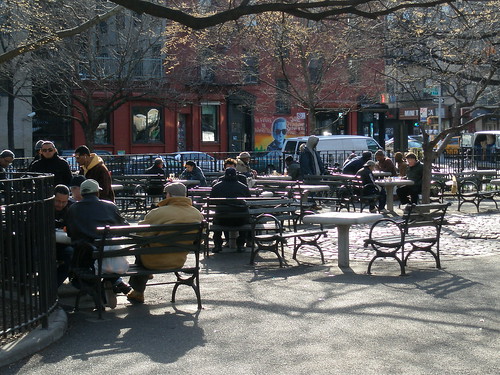When I was growing up in California, earthquakes were kind of fun. You got to hide under your desk or in your doorway, and whether you were in sixth or second grade your teacher always freaked out and rushed outside to the baseball field without providing any instruction to the kids.
The feeling of a southern California earthquake was unmistakable; it rattled the house and shook you with quick jolts. My sister and I would drop to the ground to feel the earth move, because we knew the sweet and powerful force would not last long. I loved earthquakes – their unpredictability, their distaste for shelves, and their short lifespan prevented me from getting bored. My mother used to tell me that earthquakes were the same feeling as riding the subway, which is maybe why I moved here (she was wrong).
I used to hang up my many, many swimming medals on one nail so that should an earthquake occur, I would hear my medals clank together and know to wake up the rest of my family. In 1994 during the infamous Northridge 7-pointer, the nail holding my medals sprang off the wall in the middle of the night and my parents screamed for my sister and me to get off our bunk beds and get in the hallway. We huddled together and my mom and dad told war stories of earthquakes past. Then we realized we’d forgotten to wake my brother. He was fine.
But earthquakes were never something you missed school for, and there was never an “earthquake season” or a way to predict earthquakes. When I moved to the East Village, I reveled in seasons and in the predictability of it being cold in winter and still cold in spring. There was bound to be a blizzard at some point in the year and bound to be heat-related misery at some point in August.
Many New Yorkers shake their fists at the city for being inconveniently located in an area that is far away from the equator, but I told myself I was happy being so far away from my nail of medals. Sure, earthquakes were fun, but one has to graduate to natural disasters that fit your schedule and allow you to miss work and stay inside to watch movies.
Then, in broad daylight yesterday afternoon, New York City felt an earthquake.
I noticed the wheels of my chair rolling, then my desk begin to sway. I looked up at the ceiling and saw a giant pipe that hung on wires swaying like a pendulum. When did that get there? Was it going to fall and crush me so that I would be unable to continue working and have to stay home and watch movies? This was not like the earthquakes in California. This quake felt like some sort of half-assed swaying motion, as if the city was walking home drunk in the middle of the afternoon. It felt, in fact, like riding on the subway.
I ran outside and saw one of the pieces on a Tompkins Square chess board had fallen over. Everyone in the park was staring at it in fear. I stood on top of the chess board and announced that all was going to be okay. I was from California, I came in peace, and everyone should keep calm and carry on like we do back West.
“Don’t you want people to think you’re from California too?” I asked. This tactic worked.
Finally, the city was complete for me. I could at last call it home. I wondered how many other displaced Californians felt the same way. As I walked, knees slightly bent in case I wanted to jump on the ground to fully feel an aftershock, I decided to join a swim league so I could begin acquiring large quantities of bronze medals. I knew just where I’d hang them, stacked against each other, so I could be prepared for the next New York earthquake.




